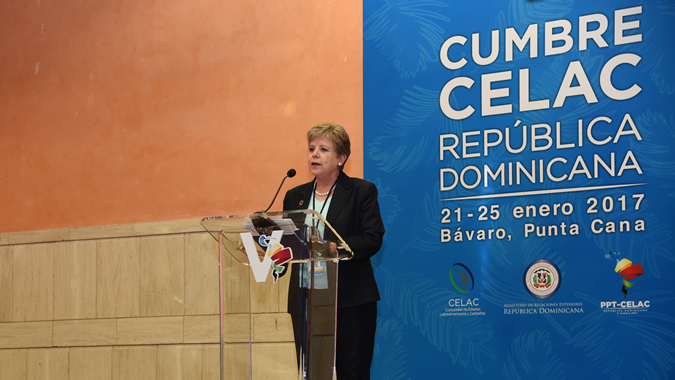ECLAC Presents to CELAC the Region’s Challenges to Achieving Sustainable Development in a Complex Context
The regional organization’s Executive Secretary, Alicia Bárcena, made a presentation before the Foreign Ministers attending the bloc’s V Summit of Heads of State and Government in the Dominican Republic.

The Executive Secretary of the Economic Commission for Latin America and the Caribbean (ECLAC), Alicia Bárcena, gave an economic and social overview of the region and detailed the challenges it faces to move toward the sustainable development that the 2030 Agenda proposes amid a complex context, during a presentation before the Foreign Ministers attending the V Summit of Heads of State and Government of the Community of Latin American and Caribbean States (CELAC).
“Given the great uncertainty today, moving ahead on regional integration is more necessary than ever,” the senior United Nations official indicated in her presentation at the XIII Meeting of Ministers of Foreign Affairs of CELAC, held this Tuesday in Bávaro, the Dominican Republic, ahead of the presidential gathering on Wednesday, January 25. Before the Foreign Ministers, Bárcena advocated as well for promoting productive diversification based on the technological revolution and incentives linked to fighting climate change.
The Executive Secretary warned that Latin America and the Caribbean is recording low growth —ECLAC calculates that in 2016 the economy contracted 1.1% and it projects a 1.3% expansion for 2017— which is compounded by the deceleration of trade, scarce physical investment, in human capital and in research and development, and the persistence of extreme vulnerability and of structural imbalances, such as the stagnation in poverty reduction (estimated at 29.2% for 2015), as well as limited productive diversification.
During her presentation, Bárcena explained that today the world is also experiencing low growth rates in Gross Domestic Product (GDP) and trade, while financial flows acquire growing importance. At the same time, inequality has worsened—8 individuals own wealth equivalent to that of the planet’s poorest 3.6 billion people—migration toward developed regions has risen, the digital revolution has accentuated the concentration of business ownership in the United States and Asia, and climate change has revealed itself to be the biggest market flaw.
In addition to these changes, there are growing uncertainties and risks regarding the new geopolitical context. “An international system with few regulations and where multilateral mechanisms are weak favors the strongest actors,” Bárcena warned. In light of this, she advocated strengthening the governance of globalization and promoting new public-private alliances that can produce a change in the productive structure of Latin American and Caribbean countries on the basis of an environmental big push.
For this to happen, ECLAC’s most senior representative said, it is necessary that active fiscal policies be put into place that reduce evasion and safeguard public spending, while also diversifying the investment portfolio toward sectors outside the extractive industries, stimulating industrialization, increasing the local component of production, fomenting productive intraregional integration, accelerating trade facilitation, implementing a regional infrastructure program, and moving toward a single digital market.
These will be some of the issues debated at the first meeting of the Forum of the Countries of Latin America and the Caribbean on Sustainable Development, the regional mechanism for follow-up to the 2030 Agenda, which will be held in Mexico from April 26 to 28, under the auspices of ECLAC.
The regional body also handed out the 2016 edition of the Economic and Social Panorama of the Community of Latin American and Caribbean States, which brings together information from some of the main annual reports published by the Commission in 2016 and synthesizes in six chapters the regional situation in economic, social and population matters, as well as foreign investment, trade and gender equality.
This document gives continuity to the efforts carried out since the I Summit of CELAC, held in 2013, and reflects the United Nations organization’s steadfast commitment to this bloc, with which it has collaborated from the start and during the Pro Tempore Presidencies held thus far by Chile, Cuba, Costa Rica, Ecuador and the Dominican Republic. With 33 member countries, CELAC, founded in Caracas, Venezuela, in 2011, groups all the States of the Americas with the exception of the United States and Canada.
Related content
Economic and Social Panorama of Latin America and the Caribbean
Presentation by Alicia Bárcena, ECLAC Executive Secretary, during the XIII Meeting of Ministers of Foreign Affairs of CELAC in the Dominican Republic.
Quinta Cumbre de Jefes de Estado y de Gobierno de la Comunidad de Estados Latinoamericanos y Caribeños (CELAC)
Intervención de Alicia Bárcena, Secretaria Ejecutiva de la CEPAL.
Subregional headquarter(s) and office(s)
Contact
Public Information Unit
- prensa@cepal.org
- (56 2) 2210 2040